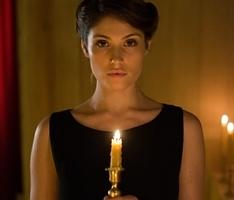The Duchess of Malfi Review 2014
Many feared that Shakespeare's Globe - a presumed reproduction of the great outdoor theatre, the 'Wooden O' of his time - would be a gimmick: a tourist attraction which would add little to the knowledge and enlivening of the plays of his time. They were proved wrong, and despite its lack of modern technology the Globe has added a joyful new understanding (not least of the conspiratorial relationship between groundlings and performers, implicit in so many texts). Now there is a tiny, 350 seat indoor playhouse attached to it, reflecting the Jacobean development of grander, candlelit intimacy of performance.
It turns out to be rather wonderful: holding us spellbound on the hard wooden benches, beneath the gilded stars and clouds of its ceiling. At least, it works like a dream for this first production, Dominic Dromgoole's vigorous, savage, three-hour rendering of John Webster's story of an innocent Duchess under the power of two noble psychopaths, her brother Duke Ferdinand and his brother the Cardinal. (It must be remembered that in post-Reformation England it paid to portray European Catholics as mad and bad: a lovely note in the programme quotes a Venetian Envoy grumbling 'The English never put on any public show whatever, be it tragedy or satire of comedy, into which they do not insert some Catholic churchman's vices and wickednesses').
But the play is greater than that, more than the horror-story which a bald retelling of its plot might make it seem. And there is something ancient and breathtakingly unaccustomed in seeing it in the intimacy of this little theatre, lit only by a hundred wax candles. The lighting is dim but technically clever and oddly exciting, flames burning in seven bare candelabra which rise and fall on ropes, mirrored sconces on the wall, and lanterns carried by actors. Even more vivid is their absence, in the dreadful moment when Ferdinand gives his sister a severed hand to kiss, and she like we are in pitch-black darkness. Her first clue to the horror is that it is cold; the second, which we share, that his voice moves away from her while she still holds the thing.
The performances shine too. Gemma Arterton, in her first big classical role, is at ease with Webster's vivid verse and, as importantly, with the character of a noblewoman who is also a lover and a fulfilled woman and mother, whose natural optimistic sweetness cannot believe that her brothers' 'tempest'of anger at her secret marriage to a steward will not rapidly abate. Meanwhile David Dawson as Ferdinand is arrestingly alarming, sometimes chill in dignity and sometimes barking in increasingly uncontrolled rages. Sexual disgust makes his incestuous weirdness explicit as he imagines her with some 'strong-thighed bargeman', and lays a trembling hand on her dead thigh after his henchman Bosola has had her strangled. For despite the aristocratic setting and the politics on its edges, it is not a play about public affairs but deeply private depravity. Sean Gilder's Bosola is notable too, a crew-cut mercenary at first, drawn gradually (to his subtle reluctant horror) into Ferdinand's nasty games.
Altogether a joy then, despite the famous difficulty of the fifth act where the Duchess is dead, her husband exiled, the Cardinal wielding a poisoned Bible, his mistress manoeuvring (a great performance by Denise Gough) and Ferdinand so unhinged he thinks he is a werewolf and roams the alleys with bits of stolen corpse. The candlelight makes it all surreal, half-nightmare: Claire van Kampen's lovely score for viola, fiddle, recorders, theorbo, lute and cittern weaves the practical magic of a rediscovered age. It touches the heart across four centuries.
"The big problem with the show is that even in this intimate space the former Bond girl Gemma Arterton makes so little impression as the Duchess."
Charles Spencer for The Telegraph
"The luminous Gemma Arterton beautifully captures the multi-faceted quality of the Duchess ..."
Paul Taylor for The Independent
"... the success of the evening lies in the fact that Webster's play and this exciting new space [the Sam Wanamaker Playhouse] make a perfect fit."
Michael Billington for The Guardian
"The tone is intimate and chatty rather than declamatory, which seems to be a deliberate antidote to the melodramatic excesses of the original."
Simon Edge for The Daily Express
"The atmosphere is highly charged, with the elegant, rustling costumes adding to the sense of shadowy gorgeousness."
Henry Hitchings for The Evening Standard
External links to full reviews from popular press
- Telegraph - Independent - Guardian
Originally published on
